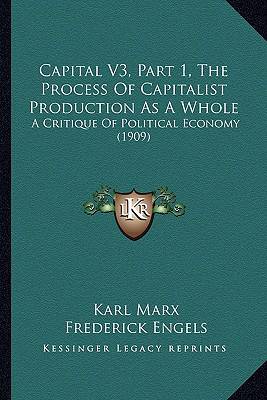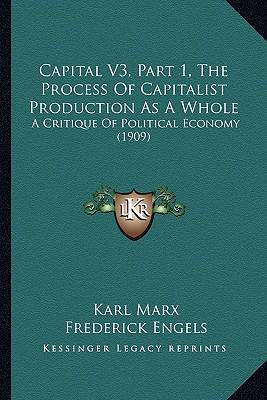
- Afhalen na 1 uur in een winkel met voorraad
- Gratis thuislevering in België vanaf € 30
- Ruim aanbod met 7 miljoen producten
- Afhalen na 1 uur in een winkel met voorraad
- Gratis thuislevering in België vanaf € 30
- Ruim aanbod met 7 miljoen producten
Zoeken
Capital V3, Part 1, The Process Of Capitalist Production As A Whole
A Critique Of Political Economy (1909)
Karl Marx
Paperback | Engels
€ 71,95
+ 143 punten
Uitvoering
Omschrijving
Capital V3, Part 1, The Process Of Capitalist Production As A Whole: A Critique Of Political Economy is a book written by Karl Marx in 1909. It is the third volume of Marx's seminal work, Capital, which is a comprehensive analysis of the capitalist system. In this volume, Marx focuses on the process of capitalist production as a whole, examining the ways in which capital is accumulated and how it is used to exploit labor.Marx's critique of political economy is a scathing indictment of the capitalist system, arguing that it is inherently exploitative and oppressive. He argues that the accumulation of capital is achieved through the exploitation of labor, and that the capitalist system is characterized by a constant struggle between capitalists and workers.The book is divided into several chapters, each of which examines a different aspect of the capitalist system. Marx discusses the accumulation of capital, the role of credit and finance, the labor process, and the relationship between capital and labor. He also explores the concept of surplus value, which he argues is the source of capitalist profits.Throughout the book, Marx employs a rigorous analytical approach, drawing on his extensive knowledge of economics and history to provide a detailed critique of the capitalist system. His arguments are backed up by extensive research and data, making this book an essential read for anyone interested in understanding the workings of capitalism and its impact on society.Overall, Capital V3, Part 1, The Process Of Capitalist Production As A Whole: A Critique Of Political Economy is a groundbreaking work that continues to influence economic and political thinking to this day. It is a must-read for anyone interested in understanding the fundamental flaws of the capitalist system and exploring alternative economic models.This scarce antiquarian book is a facsimile reprint of the old original and may contain some imperfections such as library marks and notations. Because we believe this work is culturally important, we have made it available as part of our commitment for protecting, preserving, and promoting the world's literature in affordable, high quality, modern editions, that are true to their original work.
Specificaties
Betrokkenen
- Auteur(s):
- Uitgeverij:
Inhoud
- Aantal bladzijden:
- 720
- Taal:
- Engels
Eigenschappen
- Productcode (EAN):
- 9781167252228
- Verschijningsdatum:
- 10/09/2010
- Uitvoering:
- Paperback
- Formaat:
- Trade paperback (VS)
- Afmetingen:
- 152 mm x 229 mm
- Gewicht:
- 948 g

Alleen bij Standaard Boekhandel
+ 143 punten op je klantenkaart van Standaard Boekhandel
Beoordelingen
We publiceren alleen reviews die voldoen aan de voorwaarden voor reviews. Bekijk onze voorwaarden voor reviews.











